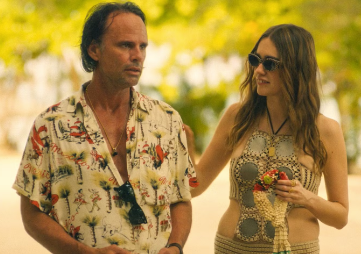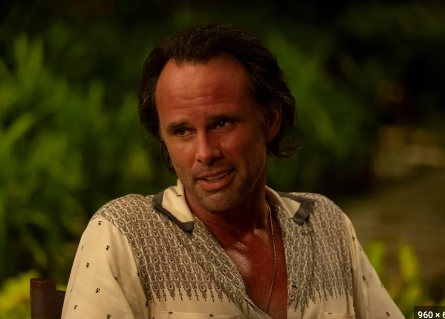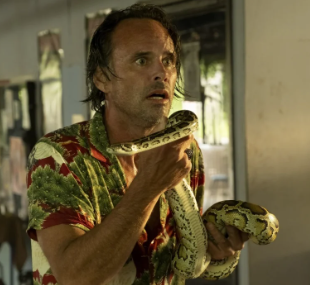White Lotus: A Synopsis of a Dysfunctional Relationship and Insecure Attachment on Season 3.
- Erma Kyriakos
- Mar 19
- 5 min read
Updated: Mar 26
POWER! MONEY! LACK OF MONEY! SEX! MURDER! INCEST!
SPOILER ALERT DISCLAIMER!
I’m writing this blog post before the airing of the last episode - so - there is more to be discovered, for sure. There are so many juicy relationship dynamics in this show that I could write a book. For this blog post, I had to be reluctantly selective and chose Chelsea and Rick’s relationship to exemplify an insecure attachment in White Lotus Season 3.
LET’S GET INTO IT.
Chelsea: Anxious Attachment: “He’s like my child”... “He’s 50.”.
OK, that's one of many clues. Here’s the case for why I think she’s anxiously attached:
First of all - what is anxious attachment?: When someone is anxiously attached to their partner, it means they long to be seen, heard, and valued in their relationships. They can become preoccupied with the connection they have with their partner - so much so that they can neglect themselves in service of their partner (codependency). Oftentimes, anxiously attached people did not get the validation and mirroring they needed when they were a baby, and their primary caregiver (mom, dad, grandma, etc.) was inconsistent with their attention and care, leaving the child confused as to what is an appropriate way and context to ask for love and attention. So it makes sense that the child, now an adult, seeks it out constantly if they are in fear of it going away with no warning (as it happens in the Chelsea+Rick relationship).
This dynamic with their primary caregiver as a child can manifest as they get older into low self esteem, low self compassion, and self confidence. One way the adult child who is anxiously attached gets love and affection from their partners is by constantly caretaking them - almost proving their worth over and over to receive their love. At their worst, anxiously avoidant partners are seen as needy, clingy, and overbearing. Often, this type of insecurely attached person ends up with avoidant types (*cough* Rick *cough*) - because that dynamic is familiar and comfortable. This might be seen as part of a repetition compulsion, or a repetitive relational pattern we choose in hopes of (unconsciously or consciously) trying to fix the relationship and finally get what we always needed - consistent and unconditional love and validation.
In the show, Chelsea’s constant focus is on Rick and his well-being (signing him up for one on one therapy sessions, begging him not to go to Bangkok, worried about his stress, etc.). It’s almost endearing and on the surface, it might even seem like she’s just an extremely caring person and partner. I don’t think that’s a wrong assessment, per say, but it does seem extremely one sided, where Chelsea is not given the same consideration from Rick. If they were my couple in therapy, I’d really try to make the point to her that although I can see how much she cares for Rick, you cannot change him, Chelsea. You are not responsible for his actions, nor do you have the power to manage his behavior. Isn’t it exhausting to be the one who is carrying the emotional burden for both you AND your partner? I’d try to empower Chelsea to move from what couple therapist, Terry Real, calls a ‘one-down’ position to even the playing field between her and Rick. I’d try and empower her to focus and vocalize her needs and boundaries sooner, rather than later.
However, anxiously attached people do carry positive influence in the partnership if they come to understand themselves and their needs. As we see Chelsea choosing to go on the yacht as her boyfriend, Rick, decides to pursue Bangkok, it is because SHE is tired of being in this dynamic and she is choosing herself for once. It may not be the best setup for connection, but she is definitely going to change the dynamic between them by choosing herself more often. The anxiously attached person is often the one in the partnership that seems more unhinged, but actually, understands the dynamics of the relationship very well. You can see in the show that there is a highly empathetic, almost clairvoyant quality to Chelsea.
Rick: Avoidantly Attached.
If Rick’s persona could only say one line, it might as well be, I don’t want to get into it. True to an avoidantly attached person’s tendency, Rick is oh-so-tight-lipped about what’s going on inside of him. His internal, emotional landscape is off limits to his partner. He might have grown up with very distant caregivers who were emotionally and/or physically neglectful. This in turn makes the child believe that no one will be there for them and they stop asking for the love and affection they want, because their caregivers basically ‘trained’ them not to ask by never giving it.
Avoidantly attached adults subscribe to the ‘rugged individual’ idea that they don’t need anyone else to help them with anything. At their worst, they can be somewhat narcissistic and antisocial, solidly (or so they think) standing on an island perfectly curated for one. They can, on the surface, seem put together and regulated but can also be more prone to things like addiction and infidelity as they are internally harboring anxiety, and insecurity with no relational way to be seen and validated, which can induce shame about these difficult feelings. In fact, when a partner does empathize with these feelings, it’s often dismissed and the avoidantly attached person can feel invaded by being seen in this way. OR you just end up smashing a bunch of snake cages to experience some kind of emotion and feel some semblance of freedom.
If Rick and Chelsea came to see me for couples therapy, I might invite Rick to get more in touch with his own feelings. Maybe even by means of the body experience: Where does that show up in your body? A tightness in your chest? A churning stomach? A headache? He’d probably hate that, but it’s a great way for people who aren’t practiced in feeling emotions to access them. I might continue with, If that part of you could talk, what would it say? What does it need? Can we ask for that? Yea, he’d definitely hate that…
I would empathically confront him, explaining how his “individuality” is negatively impacting his relationship and his partner. We have to consider her too, Rick. She’s someone you chose to be with. We cannot dismiss her any more.
Are you resonating with some of this? All of this? Do you want some support on how to identify and change the power dynamic in your relationship?
You don’t have to do it alone. I can help. Contact me today to set up an appointment. Online therapy serving all of California and in person therapy in Sebastopol, California.








Oh wow feel like I know the characters more now! Love this